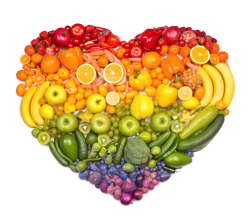Changes associated with normal ageing increase nutritional risk for older adults. As activity levels and energy requirements decrease with age, there is a reduction in the total energy intake, as well as a decline in the intake of nutrients, including vitamins and minerals.
Food Acupuncture: Vitamins & Minerals
Small but significant: Tiny amounts big results Structuring/building/connecting/energizing/repairing/healing…
The power of vitamins comes from the power of real food
Vitamins
There is strong evidence for increasing the requirements of vitamins B12 (cobalamin), B9 (folic acid) and D in the elderly. Furthermore, dietary studies indicate that older people do not consume enough B3 (niacin), B2 (riboflavin) and zinc. Potassium and magnesium deficiencies will also impact their health.
Cobalamin (vitamin B12) is most commonly caused by poor absorption and low intake of foods rich in the vitamin, such as liver, fish, meat and milk. As reduced stomach acid, which often occurs among the elderly, makes it hard to absorb calcium and vitamin B12 from food, there is a higher risk of deficiency for this age group. Heart burn medication and some medical conditions, e.g. digestive diseases, can also block absorption of the vitamin. Though B12 deficiency can cause anaemia and a variety of neurological diseases, it can easily be treated with intramuscular shots or oral supplements.
Folate (vitamin B9) is also important; it works together with B12 in reducing the levels of blood homocysteine. High levels of this bad blood chemical is strongly correlated with heart attacks and strokes. Therefore, both folate and B12 levels should be kept up as we get older.
Intake of vitamin D in older adults should be the equivalent of at least 800-1000 units daily, provided in the diet or as a vitamin D3 supplement with additional calcium.
Riboflavin (B2) may reduce the risk of cataracts; however, it was reported that 25% of people between 65 and 90 years of age consumed less than the recommended intake. Furthermore, older people suffering from acute ischaemic stroke have been found to be deficient in riboflavin.
Niacin (B3) intake is found to decrease between the ages of 60 and 90 years, and it has been reported that 15% to 25% of older adults do not consume enough of this vitamin in their diets to meet the recommended amount. To counter these findings, the elderly should maintain a diet that consists of good sources of niacin or increse their intake with supplements.
Vitamin D deficiency can be a problem for older people, and mainly resulting from impaired skin synthesis of the vitamin due to ageing skin and lack of sun exposure, particularly in the elderly in institutionalised settings. Dietary vitamin D intake is also often low in older adults. Vitamin D deficiency may contribute to muscle weakness and the development of osteoporosis, falls, fractures and depression.
Minerals
Magnesium (Mg) is a vital nutrient that has been neglected until recently. It is a co-factor for hundreds of biological reactions, and its main functions in the body include maintaining normal nerve, muscle and vascular functions, supporting a healthy immune system, and preserving strong bone structure. Magnesium is also needed to lower cramps and spasms.
In the elderly, the intake and absorption of dietary magnesium is lower and not enough to control blood pressure, decrease the risk of heart disease, and maintain good immune function. Increased dietary magnesium consumption from meat, fish, dairy products, green and leafy foods such as spinach or parsley, whole grains, and nuts should be encouraged. Daily magnesium supplementation is recommended to overcome deficiency.
Potassium (K) is associated with the decreased risk of stroke, hypertension, osteoporosis, and kidney stones when the dietary intake is at least 4.7 grams per day.
Intake of other minerals, such as calcium (Ca), iron (Fe) and zinc (Zn), also tends to be lower than the recommended daily allowance for older adults. Zinc, for example, is essential for the normal functioning of the immune system and helps with infections. Red meat, fish, nuts and pumpkin seeds provide a good source of sufficient zinc to boost one’s immune system.
In conjunction with other medication
Finally, the elderly often take medications for a range of health conditions. These medications may interfere with the absorption of some vitamins (e.g. vitamin D) and minerals (e.g. magnesium) due to the interaction between the drug and nutrient, and as such, special care should be taken to ensure deficiencies, and thus further detriment to the health, are avoided.
Vegan/vegetarian diets
Vitamin B12 is almost exclusively found in animal products, e.g. eggs, milk, fish, poultry and meat. Therefore, strict vegetarians and vegans can develop B12 deficiency, which can inflict neurological damage and contribute to heart disease. Taking a multi-vitamin will solve the problem. Vegans are also at risk of inadequate vitamin D status and should consider a supplement, particularly during winter months.



